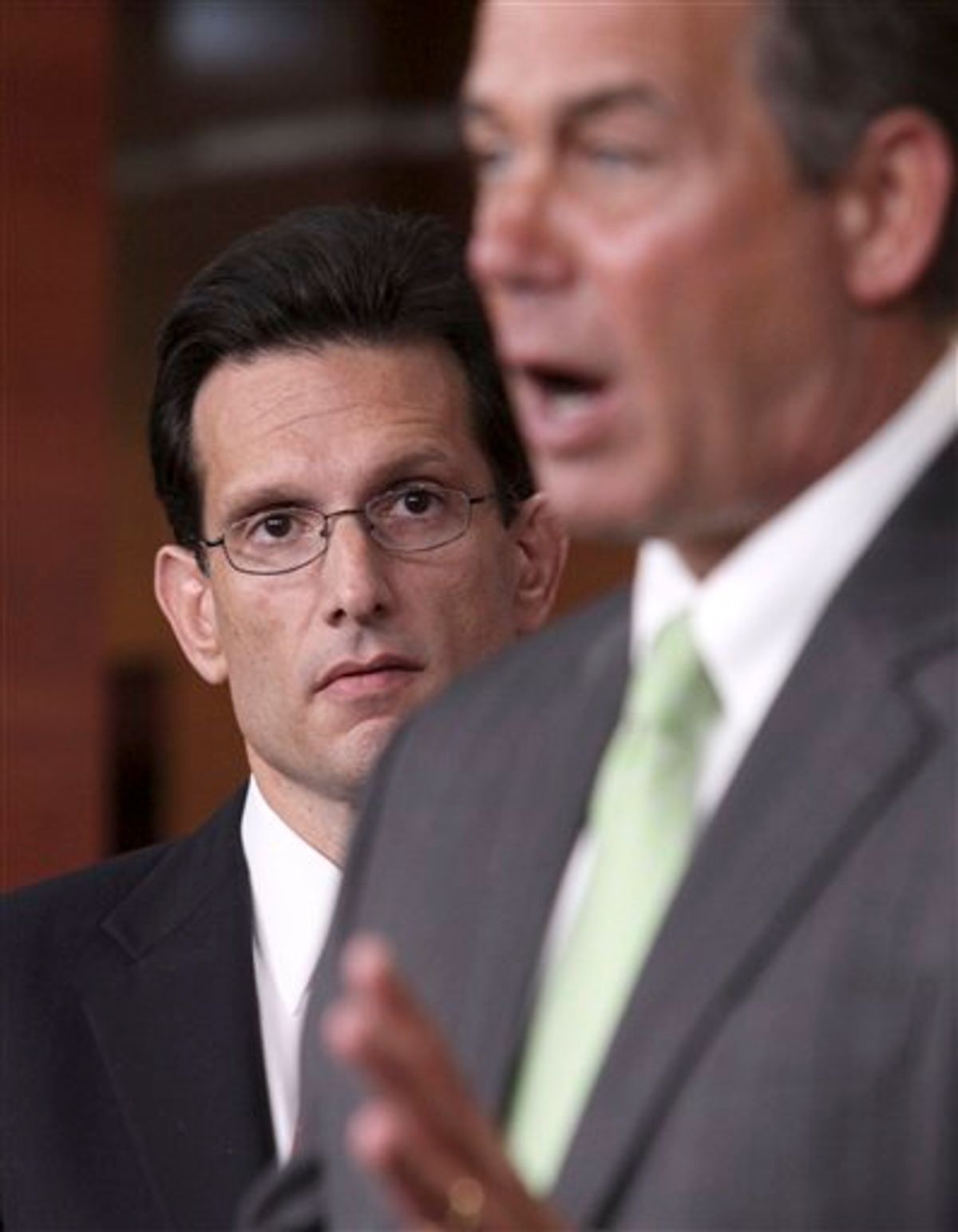Explaining why the new Republican majority in the House of Representatives plans to make one of its very first orders of business a symbolic vote in favor of repealing healthcare reform, incoming House Majority Leader Eric Cantor told reporters on Wednesday afternoon that the issue "was litigated in the last election."
Cantor is not alone, of course, in his certainty that big Democratic losses represented a rejection of Obama's signature policy achievement. Republicans campaigned against health reform and won. Q.E.D. Hard to argue with that -- although it does raise the question of what the public was thinking when it elected a landslide of Democrats into office in 2008, almost all of whom touted healthcare reform as a key part of their political agenda. How dare they carry out their promise! They must be punished! And what happens if Obama wins in 2012, and the Republican majority in the House is trimmed? Will that represent a relitigation?
There is an alternative story to tell here, one that pins the blame for the Democratic debacle on a different culprit, namely, the economy. Bad economies are tough on incumbents; it's one of the oldest rules of politics, and the most regularly enforced. And if the economy was the deciding factor in this past election, then the Republican commitment to roll back healthcare reform might end up working out a little differently than Cantor and his allies hope.
Republicans know that their chances of actually repealing healthcare reform in the next two years are negligible. There is no chance of getting 60 votes in the Senate for repeal, and Obama would certainly veto any such legislation in the unlikely event that it reached his desk. House Republicans will try to play games with funding and throw whatever wrenches into the machinery they can, and it's even conceivable they could try to demand big changes in the law in exchange for raising the debt limit. (Although its hard to imagine a more risky political strategy: reduce healthcare coverage for Americans or we'll force a sovereign default!)
So imagine this scenario. The economy continues its recent improving trend, and Americans start to get accustomed to the fact that their children can now get coverage even if they have preexisting conditions, and can stay on their parents' insurance until age 26. Even more intriguingly, what happens as the insurance industry realizes that more coverage for more Americans means more profits for insurers?
Republicans on the healthcare repeal warpath might want to take a hard look at a recent Los Angeles Times article reporting a surprising -- to the insurers -- uptick in the number of small businesses offering health insurance to their employees. The businesses are taking advantage of a tax break in the Affordable Care Act that is designed specifically for enterprises with fewer than 25 employees and moderate pay scales.
"We certainly did not expect to see this in this economy," said Gary Claxton, who oversees an annual survey of employer health plans for the nonprofit Kaiser Family Foundation. "It's surprising."
... In the six months after the law was signed in March, UnitedHealth Group Inc., the country's largest insurer, added 75,000 new customers who work for companies with fewer than 50 employees. The Minnesota company called the increase notable but declined to reveal further details.
Coventry Health Care Inc., an insurer in Maryland that focuses on small businesses, signed contracts to cover 115,000 new workers in the first nine months of this year, an 8 percent jump.
In California, Warner Pacific Insurance Services in Westlake Village, a major servicer of insurance brokers, has seen business grow more than 10 percent this year, a company executive said.
And Blue Cross Blue Shield of Kansas City, the largest insurer in the Kansas City, Mo., area, is reporting a 58 percent jump in the number of small businesses buying insurance since April, the first full month after the legislation was signed into law.
More health coverage is good for Americans and good for the insurance industry. The latter fact may not offer much solace to progressives pining for a true public option, but it ought to be positively alarming to Republicans. As the new healthcare rules continue to be rolled out, both individuals and industries will have vested interests in maintaining the status quo. Meanwhile, Republicans are offering nothing more than a rejection of the bill, without any solution to the underlying problem -- rising healthcare costs. Who is going to buy that?
We'll be watching this storyline closely over the next two years, and it will be fascinating to see how it all plays out. If the economy does rebound, and unemployment drops, and the Republicans still manage to wrest back control of the White House, well then, maybe Cantor will be proven right. But the state of litigation, at this point, is far from settled.



Shares